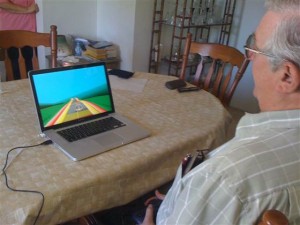Study Finds Seniors Get Mental Boost By Playing Video Games
A study coming out of The Gazzaley Lab, University of California, San Francisco, had a small group of seniors play the specialized video game, NeuroRacer specifically designed to exercise specific abilities. The findings are that the game may be able to help people over 60 years of age increase their mental abilities and work better with multitasking and staying focused to retain information.
Our powers of multitasking, staying focused when bored and retaining information do normally decline with age, Dr. Adam Gazzaley has stated. The development of the NeuroRacer game involves the player by using the joystick with the twists, turns and controlling speed. The game skills become more difficult as the player advances to its higher levels. It is found that when driving a car that we have trouble with reacting to the signs as found in another experiment of 174 volunteers between the ages of 20-79. This new specialized NeuroRacer 3D game is turning out to be more enjoyable than previous boring multitasking training. Therefore, the players are sticking with the game and are gaining skills as found by Dr. Elizabeth Zelinski at the University of Southern California.
“By playing an adaptive version of NeuroRacer in multitasking training mode, older adults (60 to 85 years old) reduced multitasking costs compared to both an active control group and a no-contact control group, attaining levels beyond those achieved by untrained 20-year-old participants, with gains persisting for 6 months. Furthermore, age-related deficits in neural signatures of cognitive control, as measured with electroencephalography, were remediated by multitasking training (enhanced midline frontal theta power and frontalposterior theta coherence). Critically, this training resulted in performance benefits that extended to untrained cognitive control abilities (enhanced sustained attention and working memory), with an increase in midline frontal theta power predicting the training-induced boost in sustained attention and preservation of multitasking improvement 6 months later. These findings highlight the robust plasticity of the prefrontal cognitive control system in the ageing brain, and provide the first evidence, to our knowledge, of how a custom-designed video game can be used to assess cognitive abilities across the lifespan, evaluate underlying neural mechanisms, and serve as a powerful tool for cognitive enhancement.”

We will need to continue research with such gaming to demonstrate results but improvements were still evident after six month following the training. Another group of who played the game at home 14 of the 16 participants retained their training after keeping up with practicing 12 hour over a time span of a month doing better than a group of younger 20 year olds who only played the game once.
One huge exciting outcome of games like NeuroRacer is that in the future they might also be able to help people who suffer with depression, dementia, brain injuries, ADD attention deficit disorder, and other possible applications. This is very exciting for us in the future, a great start as many people could benefit by such help. With further research using larger study groups this concept to boost mental skills can only get larger.
Bottom line? Keep on gaming!
NeuroRacer Research Tool Instructions:
NeuroRacer on Fast:
